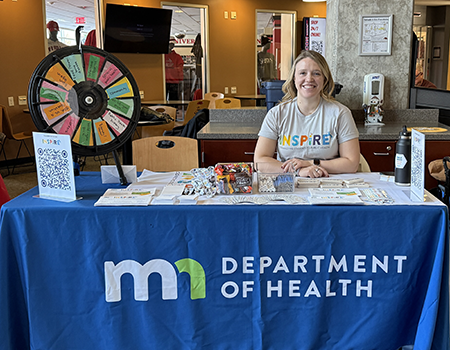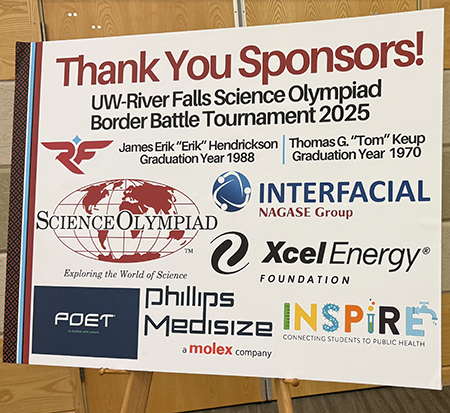
INSPIRE Program
Introducing Students to Public Health Initiatives, Rooted in Experiences
The COVID-19 pandemic brought public health into the spotlight. Many of us heard the word "epidemiologist" for the first time during the pandemic! But did you know there are several exciting careers available in the public health field? The INSPIRE program introduces middle and high school students to the ever-changing field of public health!
Public health subject matter experts from the Health Protection Bureau at the Minnesota Department of Health (MDH) visit middle and high schools to get students excited about and interested in public health. The experts lead students in engaging activities based on real-life public health scenarios.
Students gain valuable insights into the diverse world of public health careers. They engage in interactive activities that simulate real-world public health challenges, fostering critical thinking and problem-solving skills. These hands-on experiences aim to inspire students to consider a future in public health.
- Grade levels: Seventh through 12th grade classrooms.
- Classroom visits: All courses, including career exploration courses.
- Academic Standards: Aligned with the Minnesota Academic Standards in Science.
- Outreach Locations: School classrooms, after-school programs, summer programs, other (e.g., libraries).
The Health Protection Bureau is made up of three separate divisions:
Foodborne disease detectives
Students will learn how MDH detects and responds to foodborne disease outbreaks. Students will then carry out their own foodborne disease investigation. They will review case interview information to determine the likely etiology (cause of illness) and source of infection. Finally, they will discuss mitigation measures to prevent disease. The lesson is based on a foodborne outbreak in a restaurant in Winona, MN.
[Lesson content aligns with seventh grade Standard 1.2 "Planning and carrying out investigations" and Standard 2.1 "Analyzing and interpreting data."]
One Health In Minnesota
In this One Health-focused session, students will learn about the ways that environmental health, animal health, and human health all interact together. They will recognize how they, as humans, fit into the One Health Initiative. They will also learn about zoonotic disease and how preventing zoonotic disease contributes to One Health.
[Lesson content aligns with seventh grade Standard 3.1 "Developing and using models" and Standard 3.2 "Constructing explanations and designing solutions."]
Vaccination and herd immunity
Students will explore how infectious diseases spread and learn how vaccines promote individual and community health. Students will participate in an interactive game where they role-play the experience of a vaccinated or unvaccinated person. The activity also lets them explore the concept of herd immunity, showing them how vaccinated people can protect others.
[Lesson content aligns with seventh grade Standard 3.1 "Developing and using models" and "Constructing explanations and designing solutions."]
Influenza
In this interactive lesson, students will participate in an interactive group activity to learn how the influenza virus can mutate. Students will also work on a social media campaign to learn about ways to prevent influenza.
[Lesson content aligns with seventh grade Standard 1.2 "Asking questions and defining problems," Standard 2.1 "Analyzing and interpreting data," Standard 3.1 "Developing and using models," Standard 3.2 "Constructing explanations and designing solutions," and Standard 4.1 "Engaging in argument from evidence."]
Meet a public health professional
Students will hear from a public health professional at MDH about their personal journey in the field, the skills they use in their role, the problems they address, the people they collaborate with, and more! Students will participate in an interactive public health survivor game where they will read about different roles and choose which public health professional they want to assist them in surviving the public health emergency on the island.
Foodborne disease detectives
Students will learn how MDH detects and responds to foodborne disease outbreaks. Students will then carry out their own foodborne disease investigation. They will review case interview information to determine the likely etiology (cause of illness) and source of infection. Finally, they will discuss mitigation measures to prevent disease. The lesson is based on a foodborne outbreak in a restaurant in Winona, MN.
[Lesson content aligns with ninth through 12th grade Standard 1.2 "Planning and carrying out investigations" and Standard 2.1 "Analyzing and interpreting data."]
Influenza in Minnesota
In this interactive lesson, high school students will explore how the influenza virus mutates and spreads between species, including humans and animals. They will gain an understanding of the virus as a zoonotic disease and learn effective strategies to prevent its transmission. By engaging in hands-on activities, students will also discover the role they play in reducing the spread of influenza among both humans and animals.
[Lesson content aligns with ninth through 12th grade Standard 1.1 "Asking questions and defining problems," Standard 2.1 "Analyzing and interpreting data," Standard 3.1 "Developing and using models," Standard 3.2 "Constructing explanations and designing solutions," Standard 4.1 "Engaging in argument from evidence," and Standard 4.2 "Obtaining, evaluating, and communicating information."]
One Health
In this One Health-focused session, students will learn about the ways that environmental health, animal health, and human health all interact together. They will recognize how they, as humans, fit into the One Health Initiative. They will also learn about zoonotic disease and how preventing zoonotic disease contributes to One Health.
[Lesson content aligns with seventh grade Standard 3.1 "Developing and using models" and Standard 3.2 "Constructing explanations and designing solutions."]
Public health is a diverse field with dozens, if not hundreds, of career options. From epidemiology to environmental health, the possibilities are endless. Explore a few of the exciting career opportunities from our public health professionals.
Epidemiologists
An epidemiologist is often called a disease detective. They investigate the cause of diseases, how diseases spread, and how diseases can be prevented or controlled. There are many kinds of epidemiologists. Infectious disease epidemiologists study infectious diseases (such as COVID-19 or salmonella). Epidemiologists can also study chronic disease, genetics, or environmental factors like pollution.
Industrial Hygienists
An industrial hygienist inspects places of employment to detect health hazards, including those caused by airborne contaminants, toxic substances, and harmful physical agents. Industrial hygienists observe the work environment, interview employees, collect and analyze samples, and compare findings to established occupational health and safety standards. Industrial hygienists may also be called upon to investigate private residences in certain situations.
Environmental Health Specialist
An environmental health specialist works to protect human health by investigating, monitoring, and mitigating environmental hazards like air and water pollution, food safety issues, and waste disposal practices. The specialist often conducts inspections, collects data, and educates communities to promote environmental health standards.
Community Health Worker
Community health workers promote wellness by helping people adopt healthy behaviors. They implement programs and advocate for people who may have limited access to health resources and social services.
Water Operator
Water Operators play a crucial role in ensuring the safe and reliable supply of clean drinking water to communities across Minnesota. They operate and maintain water treatment plants and distribution systems, ensuring that the water meets all state and federal regulations.
Public Health Educator
Public health educators play a vital role in promoting health and preventing disease within communities. They design and implement educational programs and campaigns to raise awareness about health issues, encourage healthy behaviors, and empower individuals to make informed decisions about their health.
Food Safety Specialist
A food safety specialist monitors processing operations, inspects equipment, and identifies potential sources of contamination. Most food-borne illnesses come from bacteria, so cleanliness and temperature control are essential at every stage of production.
Data Analyst/Scientist
Data scientists play a critical role in understanding and addressing public health challenges. They collect, analyze, and interpret data to identify trends, assess health risks, and inform public health decision-making.
Public Health Laboratory Research Scientist
Public health laboratory research scientists play a crucial role in protecting public health by conducting scientific investigations and analyses. They work in laboratories to identify and characterize disease-causing agents, such as bacteria, viruses, and parasites.
Industrial Hygienist shows screen of XRF machine to a student. The XRF machine detects lead levels in items.
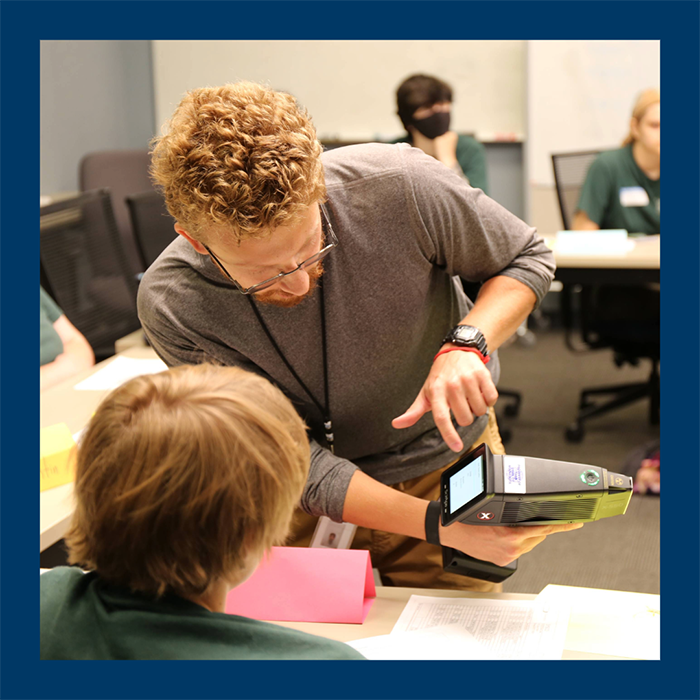
Epidemiologists presenting foodborne illness activity to middle school students
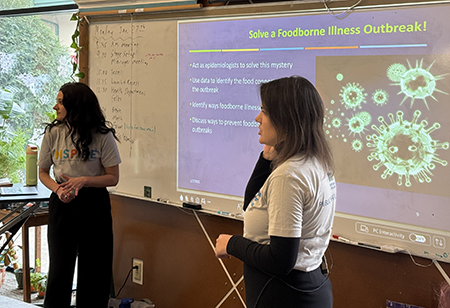
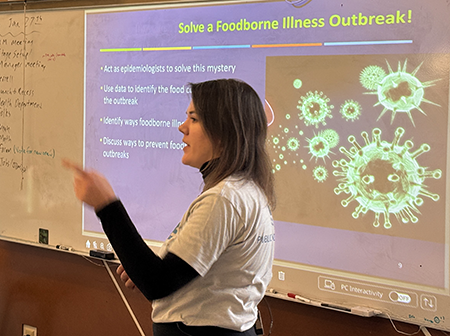
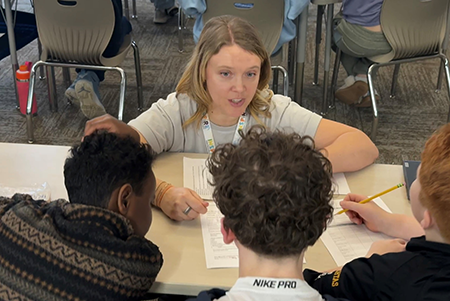
INSPIRE at the Border Battle Science Olympiad
